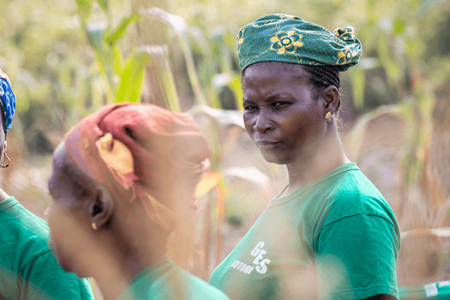by Martine Parry
Imagine having the money you earn from growing cocoa compared to a bar of chocolate.
Chocolate brings visions of decadence, spoiling yourself, but there’s another story to it. On Monday we launched a new report which revealed a gender pay gap in the global chocolate industry, with the average woman cocoa farmer paid as little as 23p a day. That’s less than a Freddo, the chocolate bar that has been informally used to measure the cost of living and inflation rates in the UK since the 1990s.
Not only are these women one fifth worse off than their husbands who earn on average just £1.25, well below the £1.40 extreme poverty line, but they work considerably longer hours, carrying out 68 percent of the labour in cocoa farming. As a result, most cocoa farmers in Côte d’Ivoire and Ghana, both men and women, live in abject poverty, toiling for an industry worth at least £4 billion in the UK each year.
To put this into context, I visited cocoa farmers in Côte d’Ivoire recently, and spent time with a Women’s Association there. In a field under the shade of a tall, sinewy tree with silver bark, we women exchanged stories about our lives and our families.
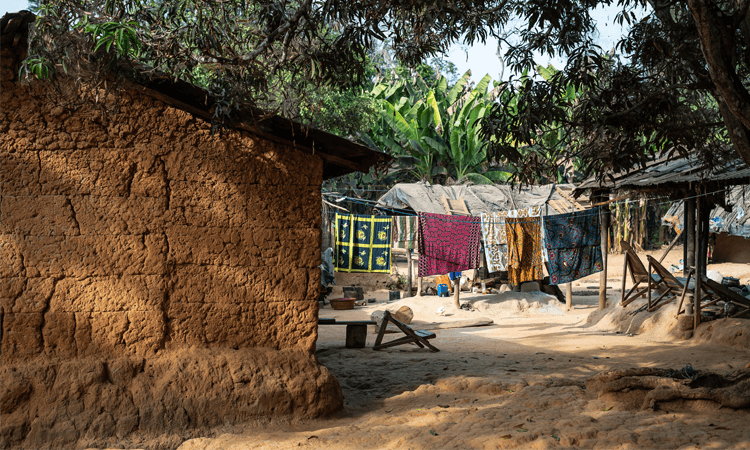
It struck me how many of the women were around my age, but were widows already. Most of the women were mothers to between eight and ten children and financially responsible for feeding, clothing and educating them. I asked why so many of the menfolk had passed away, and was told they had mainly “died of poverty”, unable to afford the medicines they needed.
Can you imagine what that must be like, not being able to afford to see a doctor or buy medicines, knowing it could likely result in such dire consequences?
One woman told me how she gets up at 4am each day and walks two kilometres to get water before making breakfast, sweeping the courtyard, and preparing the children for school. Then she walks several kilometres to the field to work with her youngest baby strapped to her back, sometimes with a toddler in tow. In the evening, she returns to her village, often carrying a heavy basket of cocoa pods on her head.
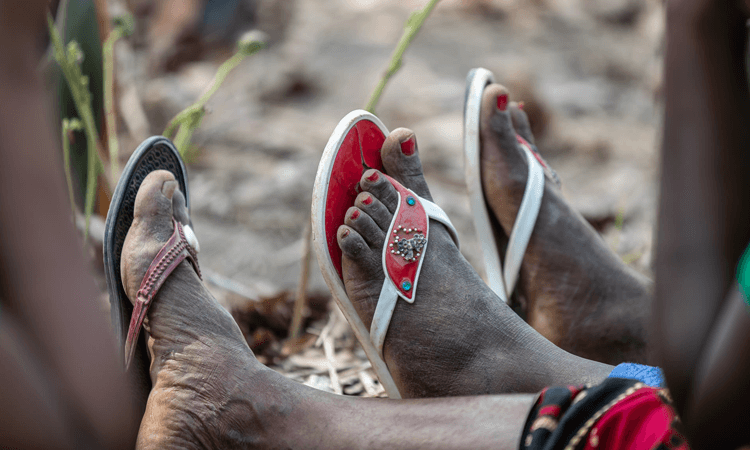
Marie France* a farmer and mother of five children said that she’s struggling because of land poverty. “My soil is losing quality, so I am facing many problems.” Yet she’s one of the lucky ones, as just 25 percent of women cocoa farmers in Côte d’Ivoire own land. Even those who do own their farm tend to have smaller, more remote and less productive plots. This makes them less able to achieve economies of scale and earn a decent income from their crops.
In fact, land is such a divisive issue for women in Ivory Coast. Sinah Troare tells me that some particularly generous husbands are beginning to pass on patches of farm land to their wives. But when a woman owns land, she still faces many barriers, including the need to hire in expensive help on the farm to do the heavy lifting.
“Normally women are given low quality land, and this is decided by the local chief.” However, some forward looking co-operatives are now supporting women in their communities to change this ingrained custom.
The UN estimates that closing the gender gap in agricultural yields would reduce the number of undernourished people by up to 150 million.
The bitter irony however is that far from being a ‘male crop’ when men do all the ‘hard work’ as commonly depicted, women’s labour is crucial for cocoa production. Men can only intensify their cocoa farming and expand and upgrade as farmers, because they rely on women (single or multiple spouses, sisters, daughters and other young women in their care) growing food crops and dong the household work, while also undertaking certain cocoa farming tasks.
These tasks include weeding and preparing the land for planting; purchasing seeds and seedlings; planting cocoa seedlings; caring for young trees and intercropping of food crops while the trees are young; harvesting and plucking; pod-breaking; carrying the beans to the homestead or depot; fermenting and drying, and bagging the dried beans. In fact, there are few tasks that are mostly undertaken by men alone.
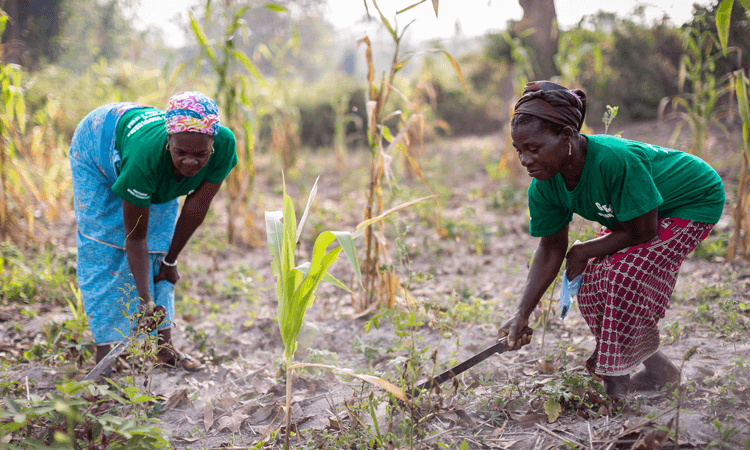
I talked to a Gender Co-ordinator at one of the co-operatives we visited who explained how cocoa is traditionally a kinship crop, but relies very heavily on women’s input. “If we have 21 steps in cocoa production, women implement 17 of them. Culturally, cocoa farming is a family activity that involves everyone, but only men implement the final stage of the process, which includes handling the money they earn.”
“Separately, we have many ‘invisible’ women in our community; they are the wives of labourers. It’s very difficult for them to express themselves and be heard.”
“I was actually initially appointed to tackle child labour, but I quickly realised that fighting child labour involves helping the women too; you always need to start with the women. When a woman can support herself financially, everyone benefits. Women are patient, determined and willing to struggle hard because this ensures the wellbeing of her family.”
Edith, who features in our She Deserves campaign, explains to me how the training she has received through Fairtrade certification has helped improve her farming practice and yields. She’s also learned about human rights, and as part of this, child rights. “We learned not to use children on farms. Farm School taught us about child labour, that it’s not good and if you want good quality produce, you need to use adults on farms and children go to school.
“Fairtrade’s training has resulted in an increase in our productivity. In the past, people always looked to expand their farms. Now we know we should improve our practices and our productivity will increase as a result. As we are facing such a scarcity of water because of climate change, we really need to focus on good farming practice.
“In the past, people begged for loans from the co-operative in the low season, but not so much anymore, and farmers are benefitting financially from better farming practices.”
As we talk softly, laughing and sharing stories and exchanging experiences, a light breeze makes dappled shadows cast by the leaves on the trees begin to dance. Edith’s closing remarks strike me in particular. “One important quality I want to tell you about that Fairtrade’s Women’s School of Leadership requires, is to also value men.”
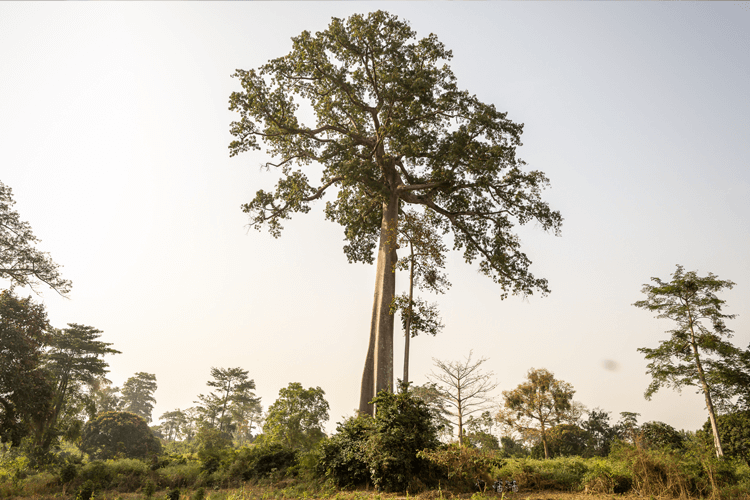
I hear from others that working in partnership is key to a thriving farm business. “Fairtrade training helped in so many ways, it taught us how to talk to our husbands and take common decisions. In the past, our husbands sold the beans and didn’t show us the money generated by cocoa sales. Now we know how to negotiate with our husbands and discuss. He now shares information about sales in so many cases. We work together in synergy and this helps us feel empowered, tire ourselves less. We exchange opinions and share tasks. We support each other, share our problems and find a common way through.”
But things are slowly changing for others too in the cocoa lands, I am told. Sinah Troaore is Chair of the Board of CAYAT, a progressive Fairtrade co-operative that is doing lots of good work on gender and people are getting to hear about it, to the extent that they received a visit from the First Lady.
“When the First Lady visited CAYAT and recognised the work of the women here, it impressed their husbands so much, they have now started giving women plots of land. People started to realise that women are very important. We took advantage of that moment to tell husbands that women are important.
“CAYAT has recruited many women to the ruling body of the organisation, and we even have a woman as a director. It’s a benefit to other women having a female director, and I feel very proud. If we replaced all producers with women, I’d be very happy. Women think first about their children and family before themselves.
“That’s why we built two kindergartens to help our women, both to educate the children earlier and to free up the women. We have provided water pumps, electricity and lights so that our children can learn and watch TV. Thanks to the Fairtrade Premium, we’ve been effective in completing these projects, which has funded half of all these activities. And we sell just 25% of our cocoa on Fairtrade terms.“ I think to myself how much more could be done if they sold higher volumes of their beans to the Fairtrade market.
“Our dream is to generate acceptable revenues for farmers and all the activities we are doing is to create better living conditions for our producers. We need cocoa to be appealing to keep young people wanting to farm it.”
*Not her real name
**The Food and Agriculture Organisation of the United Nations
